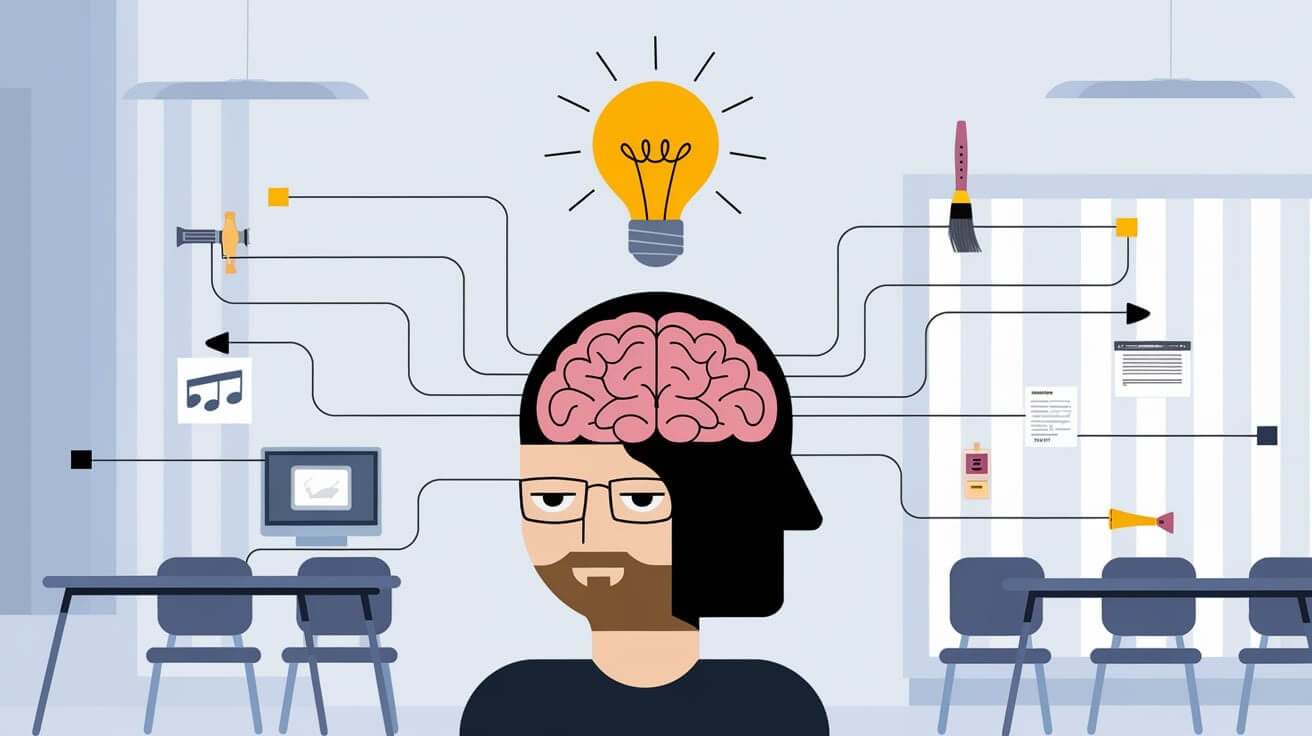
Transferable Skills for Career Success
Transferable skills are your secret weapon when building a resilient and rewarding career. These abilities aren't limited to a specific job or industry but can be applied across various roles and fields. Whether switching careers, entering the workforce, or striving for a promotion, transferable skills make you adaptable and capable in an ever-changing job market.
Imagine this: A graphic designer transitioning into a marketing role brings creativity, problem-solving, and project management skills. That's the power of transferable skills—they allow you to move seamlessly between roles while adding value wherever you go.
This guide will explore 100 essential transferable skills, categorized for clarity. We'll also provide actionable tips for developing these skills and examples of how they can be showcased. Let's dive in.
Understanding Transferable Skills

Transferable skills are essential for successful and adaptable career growth. Their relevance extends beyond specific roles, enabling individuals to contribute meaningfully in diverse contexts. Professionals can unlock new opportunities and achieve sustained career growth by understanding their values, actively developing them, and showcasing them effectively.
Whether you're navigating a career transition, aiming to exceed employer expectations, or simply enhancing your employability, transferable skills provide the tools to succeed. The journey begins with identifying your strengths, seeking growth opportunities, and confidently applying these skills in every professional endeavor. Through continuous learning and intentional effort, transferable skills become the key to thriving in an ever-evolving workplace.
What Are Transferable Skills?
Definition and Importance
You can take transferable skills from one job or industry to another. These include soft skills like communication and teamwork and hard skills like data analysis and technical writing. They make you versatile and prepared for a variety of challenges.
Employers value transferable skills because they can learn, adapt, and contribute effectively, regardless of role.
According to a LinkedIn survey, 75% of recruiters empower the importance of teamwork and communication skills in candidates.
Transferable skills are not just theoretical concepts; their importance is backed by data and expert insights. These insights reinforce the practical value of developing transferable skills for career success.
Here are some key statistics:
According to LinkedIn, 92% of recruiters consider soft skills, such as communication and teamwork, more important than technical skills in hiring decisions.
The World Economic Forum emphasizes that analytical thinking, creativity, and problem-solving will be critical in the future workforce.
A McKinsey report found that employees with strong interpersonal skills are 12% more productive than their peers.
Categories of Transferable Skills

Transferable skills are categorized into distinct groups, each representing critical areas contributing to success across various professional and personal settings. These categories comprehensively understand the diverse competencies individuals can develop and apply in multiple contexts. Each category serves a unique function, making it easier to identify strengths and areas for growth.
Communication Skills are emphasized as one of the most vital categories, focusing on sharing ideas clearly and effectively. Skills such as written articulation enable active listening, non-verbal communication, and seamless interactions in team settings or with clients. Public speaking and presentation skills further enhance one's ability to convey messages persuasively, building trust and understanding.
Leadership Skills involve guiding teams toward shared objectives. Through delegation, decision-making, and strategic planning, these skills ensure that projects are executed smoothly. Mentoring and motivating others are also included, fostering an environment where collaboration thrives.
Problem-solving skills highlight the ability to tackle challenges creatively and methodically. Analytical thinking, risk assessment, and brainstorming contribute to finding effective solutions in complex situations. These essential skills are especially valuable in roles that require innovation and adaptability.
Technical Skills cover the efficient use of technology and tools. Data analysis, project management, and programming are among the skills that fall under this category. As workplaces increasingly rely on digital tools, technical expertise becomes essential for performing tasks accurately.
Interpersonal Skills focus on building relationships and working collaboratively. Skills such as empathy, teamwork, and conflict resolution contribute to maintaining harmony in the workplace and fostering mutual respect among colleagues.
Organizational Skills include effectively managing tasks and resources. Time management, prioritization, and workflow optimization ensure productivity and help meet deadlines without unnecessary stress. Attention to detail and strategic planning are also central to this category.
Analytical Skills emphasize the interpretation of data and making informed decisions. Critical thinking, forecasting, and problem identification are integral to this group, aiding individuals in deriving insights that guide strategies and actions.
Creative Skills reflect the ability to generate innovative ideas. Whether through design thinking, content creation, or artistic expression, these skills allow for the developing of unique solutions and impactful work.
Adaptability Skills enable individuals to thrive in changing environments. Flexibility, resilience, and learning agility ensure that transitions and challenges are managed confidently and competently.
Management Skills encompass effectively leading projects and people. Budgeting, performance evaluation, and talent management demonstrate the ability to oversee operations and ensure team success.
Each category represents a critical area of competence, emphasizing the significance of a well-rounded skill set for personal and professional growth. Understanding and developing these categories can enhance individuals' adaptability and success in diverse roles.
Comprehensive List of 100 Transferable Skills

Communication Skills
-
Active Listening means fully concentrating on what is being said, understanding the message, and responding thoughtfully.
-
Public Speaking: Effectively delivering information to an audience.
-
Written Communication: Conveying ideas clearly and concisely in writing.
-
Non-Verbal Communication: Using body language, facial expressions, and gestures to communicate.
-
Negotiation: Reaching mutually beneficial agreements through discussion.
-
Persuasion: Convincing others to understand or adopt a particular viewpoint.
-
Presentation Skills: Delivering information engagingly and effectively.
-
Conflict Resolution: Mediating disputes and finding amicable solutions.
-
Storytelling: Crafting and sharing narratives to convey messages.
-
Networking: Building and maintaining professional relationships.
Leadership Skills
-
Team Management: Overseeing and guiding team members to achieve objectives.
-
Decision-Making: Choosing the best course of action among alternatives.
-
Delegation: Assigning tasks to others effectively.
-
Mentoring: Offering advice and assistance to individuals with less experience.
-
Strategic Planning: Setting long-term goals and determining the best approach.
-
Motivation: Inspiring others to take action.
-
Vision Setting: Establishing a clear and compelling direction for the future.
-
Crisis Management: Handling unexpected and disruptive events effectively.
-
Ethical Leadership: Leading with integrity and by moral principles.
-
Change Management: Guiding and implementing organizational change.
Problem-Solving Skills
-
Analytical Thinking: Breaking down complex information to understand it better.
-
Creativity: Generating innovative ideas and solutions.
-
Research: Systematically investigating to establish facts and reach conclusions.
-
Risk Assessment: Identifying and evaluating potential risks.
-
Troubleshooting: Diagnosing and resolving problems.
-
Innovation: Introducing new ideas or methods.
-
Logical Reasoning: Applying structured thinking to solve problems.
-
Brainstorming: Collaboratively generating ideas.
-
Root Cause Analysis: Determining the underlying reason behind problems.
-
Solution Implementation: Executing plans to resolve problems.
Technical Skills
-
Data Analysis: Interpreting data to inform decisions.
-
Programming: Writing code to create software applications.
-
Project Management: Planning and overseeing projects to completion.
-
Technical Writing: Creating documents that explain complex information clearly.
-
Software Proficiency: Being skilled in using various software tools.
-
Systems Analysis: Examining systems to improve efficiency.
-
Quality Assurance: Ensuring products meet certain standards.
-
Cybersecurity: Safeguarding systems and information against cybersecurity threats.
-
Network Management: Maintaining and administering computer networks.
-
Technical Support: Assisting users with technical issues.
Interpersonal Skills
-
Empathy: Recognizing and empathizing with the emotions of others.
-
Teamwork: Working together with others efficiently to accomplish common objectives.
-
Conflict Resolution: Mediating disputes and facilitating amicable solutions.
-
Negotiation: Reaching mutually beneficial agreements through discussion.
-
Networking: Building and maintaining professional relationships.
-
Empathy: Recognizing and empathizing with others' emotions to establish a genuine connection.
-
Patience: Maintaining composure and understanding in challenging situations.
-
Active Listening means giving your full attention to what someone is saying, grasping their message clearly, and replying considerately.
-
Adaptability: Adjusting effectively to new conditions or environments.
-
Cultural Competence: Interacting effectively with people from different cultures and backgrounds.
Organizational Skills
-
Time Management: Prioritizing tasks to use time efficiently.
-
Multitasking: Managing several tasks at once while maintaining a high-quality standard.
-
Scheduling: Planning activities to ensure efficient use of time and resources.
-
Resource Management: Allocating resources effectively to meet objectives.
-
Goal Setting: Defining clear, achievable objectives.
-
Attention to Detail: Maintain accuracy and attention to detail when completing tasks.
-
Delegation: Assigning tasks to others to optimize productivity.
-
Record Keeping: Maintaining accurate and organized records.
-
Strategic Planning: Setting long-term goals and determining the best approach.
-
Prioritization: Determining the order of tasks based on their importance.
Analytical Skills
-
Critical Thinking: Analyzing information carefully to make well-informed choices.
-
Data Analysis: Interpreting data to extract meaningful insights.
-
Research: Systematically investigating to establish facts and reach conclusions.
-
Forecasting: Predicting future trends based on current data.
-
Problem-Solving: Identifying issues and developing effective solutions.
-
Decision-Making: Choosing the best course of action among alternatives.
-
Logical Reasoning: Applying structured thinking to solve problems.
-
Quantitative Analysis: Working with numerical data to make decisions.
-
Qualitative Analysis: Assessing non-numerical data to understand concepts.
-
Attention to Detail: Ensuring accuracy in analysis and reporting.
Creative Skills
-
Innovation: Introducing new ideas or methods.
-
Creative Thinking: Thinking outside the box to develop unique solutions.
-
Design: Creating visual or functional concepts.
-
Artistic Ability: Producing works of art or design.
-
Storytelling: Crafting and sharing narratives to convey messages.
-
Content Creation: Developing engaging material for various platforms.
-
Marketing: Promoting products or services creatively.
-
Writing: Expressing ideas clearly and effectively in written form.
-
Editing: Reviewing and refining content for clarity and accuracy.
-
Photography: Capturing images to communicate ideas or tell stories.
Adaptability Skills
-
Flexibility: Adjusting to new conditions or changes.
-
Resilience: Recovering quickly from setbacks.
-
Open-Mindedness: Being receptive to new ideas or opinions.
-
Versatility: Being capable of adapting to many different functions or activities.
-
Learning Agility: Quickly understanding and applying new information.
-
Stress Management: Maintaining performance under pressure.
-
Resourcefulness: Identifying efficient and creative solutions to address challenges.
-
Self-motivation: Initiating tasks and projects independently.
-
Independence: Working effectively with minimal supervision.
-
Initiative: Taking proactive steps to address issues or opportunities.
Management Skills
-
Project Management: Planning and overseeing projects to completion.
-
Team Leadership: Guiding and motivating a group towards a common goal.
-
Budgeting: Planning and controlling financial resources.
-
Performance Management: Assessing and improving employee performance.
-
Strategic Planning: Defining long-term goals and planning the steps needed to accomplish them.
-
Risk Management: Identifying and mitigating potential risks.
-
Operations Management: Overseeing day-to-day operations efficiently.
-
Supply Chain Management: Overseeing the movement and delivery of products and services.
-
Human Resources Management: Recruiting, training, and managing employees.
-
Change Management: Guiding and implementing organizational change.
Why Transferable Skills Essential in the Workplace
In today's workplace, transferable skills are essential in ensuring professional success and personal growth. These abilities, not tied to a specific industry or job function, enable individuals to adapt to new challenges, fulfill varied responsibilities, and contribute meaningfully to their teams. The importance of these skills cannot be overstated, as they serve as the foundation for employability, career transitions, and meeting dynamic employer expectations.
Enhancing Employability
Transferable skills enhance candidates' profiles by demonstrating their capacity to adjust and succeed in various workplace settings.
Employers increasingly prioritize adaptability, collaboration, and problem-solving over technical expertise alone. According to a PwC report, 91% of employers value adaptability as a crucial skill, reflecting its importance in a world where industries and roles are rapidly evolving.
Imagine a project manager tasked with coordinating cross-functional teams. Strong communication and organizational skills enable them to bridge gaps between departments, ensuring projects are completed efficiently. These competencies, transferable across industries, make the project manager an invaluable asset to any organization.
Moreover, transferable skills like teamwork, emotional intelligence, and decision-making significantly increase a candidate's employability. For instance, a financial analyst who excels in critical thinking and strategic planning is well-equipped to contribute in roles beyond their initial expertise, such as operations or consulting.
Supporting Career Transitions
Career transitions are inevitable in the modern workforce, and transferable skills are a bridge during these shifts. These skills make it possible to pivot seamlessly between roles, industries, or career paths without starting from scratch.
Consider a sales professional moving into a managerial role. Their expertise in negotiation, interpersonal communication, and conflict resolution equips them to lead a team effectively. Similarly, a graphic designer transitioning into marketing can leverage their creative thinking and project management skills to craft compelling campaigns.
According to a report by the World Economic Forum, nearly half of all employees will need reskilling by 2025 to meet the changing demands of their roles. Critical thinking, teamwork, and adaptability are crucial, enabling professionals to handle transitions confidently.
Real-life examples highlight this phenomenon. A teacher transitioning to human resources relies on their communication, mentoring, and conflict resolution skills to excel in their new role. This adaptability underscores the value of transferable skills in making career shifts less daunting and more successful.
Meeting Employer Expectations
In a competitive job market, employers increasingly seek individuals who can wear multiple hats and bring value to their teams through diverse skill sets. Transferable skills like creativity, problem-solving, and leadership are in demand, as highlighted by the World Economic Forum's Future of Jobs Report, which lists these among the most critical skills in the future.
Employers value employees who demonstrate versatility and initiative. For instance, an IT specialist who also possesses strong communication skills can act as a bridge between technical and non-technical teams, ensuring smoother project execution. This ability to transcend job descriptions enhances team dynamics and overall organizational performance.
Moreover, transferable skills allow employees to contribute beyond their core responsibilities. For example, a marketing professional skilled in data analysis can provide insights into campaign performance, making data-driven decisions that impact business strategy. This ability to integrate skills from various domains aligns with employer expectations for dynamic and proactive team members.
How to Develop and Showcase Transferable Skills
Developing and effectively showcasing transferable skills is key to leveraging their benefits in the workplace. While some skills are honed through experience, others require intentional effort and learning. Let's explore practical strategies for building and demonstrating these competencies.
Strategies for Skill Development
Enroll in Courses:
Online platforms like Coursera, Udemy, and LinkedIn Learning offer courses tailored to skill development. Topics like project management, leadership, and public speaking are covered extensively. For instance, enrolling in a course on emotional intelligence can help improve interpersonal interactions at work.
Practice Regularly:
Skills are best developed through consistent application. For example, public speaking can be practiced during team meetings or presentations. Similarly, problem-solving can be sharpened by participating in brainstorming sessions or tackling complex projects.
Seek Feedback:
Receiving constructive feedback is essential for recognizing growth opportunities. Regularly asking for input from supervisors, peers, or mentors can provide insights into how skills are perceived and where they can be enhanced. For instance, feedback on communication style might help refine how messages are delivered to different audiences.
Participate in Cross-Functional Teams:
Engaging with teams outside your immediate department exposes you to diverse challenges and perspectives, fostering collaboration, adaptability, and problem-solving skills. For example, working with a product development team can help a marketing professional understand the technical aspects of a product, enriching their overall contribution.
Showcasing Skills in Job Applications
Effectively showcasing transferable skills during the job application process is critical to standing out as a candidate. Here's how this can be done:
Resume:
Highlight relevant transferable skills by linking them to measurable achievements. For example, instead of stating "good communication skills," you might say, "Led weekly client meetings, resulting in a 20% enhancement in project alignment and efficiency."
Cover Letter:
Provide specific examples demonstrating how these skills have been effectively utilized. For example, explain how leadership abilities were used to guide a cross-functional team in completing a project before the deadline.
Interviews:
Prepare to share stories that illustrate your skills in action. Use the STAR method (Situation, Task, Action, Result) to structure responses. For example, if asked about problem-solving, recount a time when you identified a bottleneck in a process and implemented changes that improved efficiency.
Real-Life Examples
Real-world scenarios help illustrate the power of transferable skills:
-
Teacher to HR Professional: A teacher transitioning to human resources can highlight their ability to mentor, resolve conflicts, and communicate effectively—skills that directly translate into managing workplace relationships and supporting employee growth.
-
Sales Executive to Entrepreneur: A sales executive moving into entrepreneurship leverages negotiation, strategic planning, and customer relationship management to establish and grow their business.
-
Engineer to Project Manager: An engineer transitioning to project management brings analytical thinking, attention to detail, and technical expertise, ensuring projects are executed seamlessly.
Conclusion
Transferable skills are your toolkit for career growth. By developing and showcasing these versatile abilities, you can unlock new opportunities, navigate career transitions, and thrive in any professional environment. Start by identifying your strengths, practicing regularly, and presenting them confidently in your job applications.
These 100 transferable skills are not just a checklist but a pathway to building a dynamic, adaptable career. Take the first step today and watch your opportunities expand.
Frequently Asked Questions (FAQs)
1. What are transferable skills, and why are they important?
Communication, problem-solving, and teamwork are transferable skills that can be effectively utilized in different roles and industries. They are essential because they enhance adaptability, making switching careers easier, taking on new challenges, and meeting diverse job requirements.
2. How can I identify my transferable skills?
Begin identifying your transferable skills by thinking about your previous experiences—whether in work, education, or personal projects. List tasks you excelled at and the skills used to accomplish them, such as organizing events, managing teams, or solving problems. Feedback from colleagues or supervisors can also provide insights.
3. How do I highlight transferable skills on my resume?
On your resume, emphasize transferable skills by linking them to measurable achievements. For example, instead of stating "strong communication skills," write, "Facilitated weekly client meetings, leading to a 15% improvement in project delivery timelines."
4. Are soft skills the same as transferable skills?
While there is overlap, soft skills—like empathy, adaptability, and teamwork—are a subset of transferable skills. Transferable skills include specific hard skills, like data analysis or project management, that can be utilized across various roles.
5. How can transferable skills help during a career transition?
Transferable skills enable you to pivot to new roles or industries without starting from scratch. For example, a teacher transitioning to a corporate training role can apply their communication, mentoring, and organizational skills to succeed in a different environment.
Also Read:
Self-Learning Skills: Proven Techniques for Personal and Professional Growth
4Cs of 21st-Century Learning Skills in Education
How to Develop Critical Thinking Skills in the 21st Century
4 C's of 21st-Century Learning Skills
Essential Learning Skills for the 21st Century
Learning Skills for Students: Your Guide to Academic Success
Key Learning Skills for Academic Success: Effective Strategies
18 New Skills to Learn for Professional Growth
Critical Thinking Skills Can Improve Reading
Top 10 Critical Thinking Skills to Develop for Success
Transferable Skills Learning Skills




